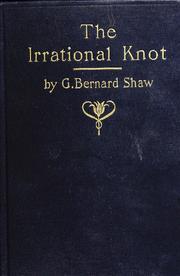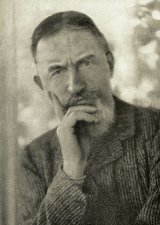The Irrational Knot
The Irrational Knot was first published in 1905, having been written in 1880. Within a framework of leisure class preoccupations and frivolities Shaw disdains hereditary status and proclaims the nobility of workers. Marriage, as the knot in question, is exemplified by the union of Marian Lind, a lady of the upper class, to Edward Conolly, always a workman but now a magnate, thanks to his invention of an electric motor that makes steam engines obsolete. The marriage soon deteriorates, primarily because Marian fails to rise above the preconceptions and limitations of her social class and is, therefore, unable to share her husband's interests.
- Year:
- 1880
- 1,104 Views
PREFACE TO THE AMERICAN EDITION OF 1905 This novel was written in the year 1880, only a few years after I had exported myself from Dublin to London in a condition of extreme rawness and inexperience concerning the specifically English side of the life with which the book pretends to deal. Everybody wrote novels then. It was my second attempt; and it shared the fate of my first. That is to say, nobody would publish it, though I tried all the London publishers and some American ones. And I should not greatly blame them if I could feel sure that it was the book's faults and not its qualities that repelled them. I have narrated elsewhere how in the course of time the rejected MS. became Mrs. Annie Besant's excuse for lending me her ever helping hand by publishing it as a serial in a little propagandist magazine of hers. That was how it got loose beyond all possibility of recapture. It is out of my power now to stand between it and the American public: all I can do is to rescue it from unauthorized mutilations and make the best of a jejune job. At present, of course, I am not the author of The Irrational Knot. Physiologists inform us that the substance of our bodies (and consequently of our souls) is shed and renewed at such a rate that no part of us lasts longer than eight years: I am therefore not now in any atom of me the person who wrote The Irrational Knot in 1880. The last of that author perished in 1888; and two of his successors have since joined the majority. Fourth of his line, I cannot be expected to take any very lively interest in the novels of my literary great-grandfather. Even my personal recollections of him are becoming vague and overlaid with those most misleading of all traditions, the traditions founded on the lies a man tells, and at last comes to believe, about himself to himself. Certain things, however, I remember very well. For instance, I am significantly clear as to the price of the paper on which I wrote The Irrational Knot. It was cheap--a white demy of unpretentious quality--so that sixpennorth lasted a long time. My daily allowance of composition was five pages of this demy in quarto; and I held my natural laziness sternly to that task day in, day out, to the end. I remember also that Bizet's Carmen being then new in London, I used it as a safety-valve for my romantic impulses. When I was tired of the sordid realism of Whatshisname (I have sent my only copy of The Irrational Knot to the printers, and cannot remember the name of my hero) I went to the piano and forgot him in the glamorous society of Carmen and her crimson toreador and yellow dragoon. Not that Bizet's music could infatuate me as it infatuated Nietzsche. Nursed on greater masters, I thought less of him than he deserved; but the Carmen music was--in places--exquisite of its kind, and could enchant a man like me, romantic enough to have come to the end of romance before I began to create in art for myself. When I say that I did and felt these things, I mean, of course, that the predecessor whose name I bear did and felt them. The I of to-day is (? am) cool towards Carmen; and Carmen, I regret to say, does not take the slightest interest in him (? me). And now enough of this juggling with past and present Shaws. The grammatical complications of being a first person and several extinct third persons at the same moment are so frightful that I must return to the ordinary misusage, and ask the reader to make the necessary corrections in his or her own mind. This book is not wholly a compound of intuition and ignorance. Take for example the profession of my hero, an Irish-American electrical engineer. That was by no means a flight of fancy. For you must not suppose, because I am a man of letters, that I never tried to earn an honest living. I began trying to commit that sin against my nature when I was fifteen, and persevered, from youthful timidity and diffidence, until I was twenty-three. My last attempt was in 1879, when a company was formed in London to exploit an ingenious invention by Mr. Thomas Alva Edison--a much too ingenious invention as it proved, being nothing less than a telephone of such stentorian efficiency that it bellowed your most private communications all over the house instead of whispering them with some sort of discretion. This was not what the British stockbroker wanted; so the company was soon merged in the National Telephone Company, after making a place for itself in the history of literature, quite unintentionally, by providing me with a job. Whilst the Edison Telephone Company lasted, it crowded the basement of a huge pile of offices in Queen Victoria Street with American artificers. These deluded and romantic men gave me a glimpse of the skilled proletariat of the United States. They sang obsolete sentimental songs with genuine emotion; and their language was frightful even to an Irishman. They worked with a ferocious energy which was out of all proportion to the actual result achieved. Indomitably resolved to assert their republican manhood by taking no orders from a tall-hatted Englishman whose stiff politeness covered his conviction that they were, relatively to himself, inferior and common persons, they insisted on being slave-driven with genuine American oaths by a genuine free and equal American foreman. They utterly despised the artfully slow British workman who did as little for his wages as he possibly could; never hurried himself; and had a deep reverence for anyone whose pocket could be tapped by respectful behavior. Need I add that they were contemptuously wondered at by this same British workman as a parcel of outlandish adult boys, who sweated themselves for their employer's benefit instead of looking after their own interests? They adored Mr. Edison as the greatest man of all time in every possible department of science, art and philosophy, and execrated Mr. Graham Bell, the inventor of the rival telephone, as his Satanic adversary; but each of them had (or pretended to have) on the brink of completion, an improvement on the telephone, usually a new transmitter. They were free-souled creatures, excellent company: sensitive, cheerful, and profane; liars, braggarts, and hustlers; with an air of making slow old England hum which never left them even when, as often happened, they were wrestling with difficulties of their own making, or struggling in no-thoroughfares from which they had to be retrieved like strayed sheep by Englishmen without imagination enough to go wrong.
Translation
Translate and read this book in other languages:
Select another language:
- - Select -
- 简体中文 (Chinese - Simplified)
- 繁體中文 (Chinese - Traditional)
- Español (Spanish)
- Esperanto (Esperanto)
- 日本語 (Japanese)
- Português (Portuguese)
- Deutsch (German)
- العربية (Arabic)
- Français (French)
- Русский (Russian)
- ಕನ್ನಡ (Kannada)
- 한국어 (Korean)
- עברית (Hebrew)
- Gaeilge (Irish)
- Українська (Ukrainian)
- اردو (Urdu)
- Magyar (Hungarian)
- मानक हिन्दी (Hindi)
- Indonesia (Indonesian)
- Italiano (Italian)
- தமிழ் (Tamil)
- Türkçe (Turkish)
- తెలుగు (Telugu)
- ภาษาไทย (Thai)
- Tiếng Việt (Vietnamese)
- Čeština (Czech)
- Polski (Polish)
- Bahasa Indonesia (Indonesian)
- Românește (Romanian)
- Nederlands (Dutch)
- Ελληνικά (Greek)
- Latinum (Latin)
- Svenska (Swedish)
- Dansk (Danish)
- Suomi (Finnish)
- فارسی (Persian)
- ייִדיש (Yiddish)
- հայերեն (Armenian)
- Norsk (Norwegian)
- English (English)
Citation
Use the citation below to add this book to your bibliography:
Style:MLAChicagoAPA
"The Irrational Knot Books." Literature.com. STANDS4 LLC, 2024. Web. 18 Apr. 2024. <https://www.literature.com/book/the_irrational_knot_7>.




Discuss this The Irrational Knot book with the community:
Report Comment
We're doing our best to make sure our content is useful, accurate and safe.
If by any chance you spot an inappropriate comment while navigating through our website please use this form to let us know, and we'll take care of it shortly.
Attachment
You need to be logged in to favorite.
Log In